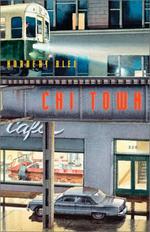Well, it's settled. In September we are leaving for Europe. This will be the longest vacation (10 whole days!) we've taken in 10 years.*
Travel plans were swiftly confirmed by the government, who (as they usually do when I am planning to travel) within 24 hours of our making the plane reservation, issued new warnings about potential terrorist threats.
I don't know why, but it seems like this happens almost every time I get ready to fly anywhere. It's as if I don't already have enough to do in terms of arrangements and packing--in odd moments I wonder if I should make out my will.
Well, anyway. We are going. I will resume being excited.
(Please don't tell me the fact that I think 10 days is a long vacation is sad. I know it is sad. Tell it to the American business community.)

I did not move to Chicago because it was the “city of big shoulders.” When I first started visiting here in the late 1980s and early 1990s, the contemporary touchstones were very different: Chicago was the city of Wax Trax Records, The Baffler, the Sea and Cake. For many of my friends, it was much less the City of Big Shoulders and more the city of Big Black and its inevitable cultural corollary, Steve Albini.
In short, I didn’t have much of a sense of the city’s history and only an English major’s nodding acquaintance with its literary heroes like Carl Sandburg and Nelson Algren.
A lot of people my age and younger seem to be in the same boat. Sometimes I sense Chicago working overtime to prove itself different from other cities—and, in the process, it falls victim to cliché. Look how working class/unpretentious/urban we are! We define ourselves by what we are not—but what are we?
As a result, people who are drawn here by the city’s claims to blue-collar sincerity find themselves leading lives that have nothing to do with the actual blue-collar class. You may be working in a restaurant or an unemployed Web designer or in a band, but you’re not actually working construction or cleaning houses for a living.
Too often, especially among the chattering class of the blog world, this creates a kind of permanent confusion about what’s “real” or “authentic” (see discussion here about the politics of dive bars) that can never really be resolved.
Norbert Blei, the author of Chi Town, had no such confusion. This selection of "true-life tales evoking a city of gritty and colorful neighborhoods and people" and doesn’t worry about irony or authenticity. It's worth reading if, like me, you came here from somewhere else.
Reading the book is a bit like time travel. It was published in 1990 as a collection, but many of the pieces are from an earlier date. It's the Chicago of the 1970s and '80s and the city of the author's childhood memories. The space between the two seems relatively seamless for the author, but today's reader often needs to make a leap. Many of the places he writes about aren't there any more. The neighborhoods he celebrates have changed, too; the European ethnics (the Czechs, Poles, and Slavs) who fascinate him in the bakeries and street fairs have been replaced by other immigrant cultures.
But there's still things in here to recognize: impressionistic views of Marshall Field's, a visit to Aiko's Art Store, the search for the best hot dog in the city, a tour of department store bargain basements. And things that have faded away, like the old location of the Public Library or Van Buren Street hangouts, come to life too.
Blei lauds Nelson Algren, who in his words “made literature out of life.” In terms of writing, his tastes also run predictably to local legends like Mike Royko and Studs Terkel. In line with their traditions, Blei’s stories are really celebrations of the common man. What’s it like to be a garbage collector, a Greek restaurateur, a window washer, a guy who works at the newsstand? The author gets it straight from the source.
At times, Tony almost spins with papers—hands behind his back, hands at both sides, hands outstretched with dimes and quarters and dollar bills (so difficult to change in the rush hours). The faces are familiar, most of them, but the names are a mystery. There is never enough time, at this time, this place. Yet everyone is welcome.
He favors the stories of the average guy on the street (or sitting on a park bench) and, to some extent, now-forgotten oddballs like Xerox artist Bill Stipe. He doesn’t worry about whether Chicago stacks up against the coasts; he believes it stacks up to the cities of Europe.
The Chicago River is our Seine. It lacks the fishermen, the artists, the bookstalls, the lovers of Paris, and it has no Notre Dame. But there is an American beauty to the river that cannot be denied.
This is at once a strength (the author knows whereof he speaks) and a drawback (if you’re curious about the perspective of a woman or an African-American or Hispanic or a young person of the time, you’ll have to look elsewhere). There’s also little awareness of pop culture, which makes it difficult to place some of the stories chronologically. I miss these points of view, but their omission is understandable; they often represent the agents of cultural change, which interfere with the author’s preoccupation with a city that is vanishing. (Blei has vanished from the cityscape, too; he moved to Wisconsin, where he apparently runs a small press.)
Blei knows the El and it figures in many of the stories. Chi Town is a good book for reading on the train, too. Reading in motion is an intermittent experience that keeps you in touch with the nature of the city; it also distracted me from the occasionally unbelievably rhapsodic nature of the author’s prose or the too-frequent typos that should have been caught by now.
These caveats aside, the book is recommended reading for anyone who wants to understand Chicago better. The author’s keen eye for detail helps us see the detail, too, and gives us a sense of the city’s past and how it evolved into what we know today. Here's a winter in memory:
A winter’s night view from the window was a dreamscape of drifting snow and pools of yellow streetlight…white flakes and the lights in the windows of the houses, the storefronts, the darkened fortress of Gary School across the street. An occasional automobile (“machines, Grandpa Blei called them) and the city skyscrapers, as I imagined them, soaring into layers of darkness, clouds of snow…trains, streetcars, and Els gliding on sliver rails, burrowing through night and new snow, passengers framed in small squares of windowlight, arriving, departing, for downtown Chicago…
If you've spent an autumn in Chicago, you know this scene:
I miss the cold October rain, the stiff wind holding people to a standstill. The city watercolored Cobalt Blue, Payne’s Gray. Coats and dresses swept away. Black umbrellas, red umbrellas…yellow and white. Heads lowered into the wind, collars turned, hands holding hats, tugging lapels close to neck. Words caught in the throat, fragmented in passing conversations, swallowed whole.
I still have a lot to learn about the city’s history. I may forever be a lukewarm student of Sandburg and Algren. But this book has reminded me to pay attention, because Chicago—like all cities—is in a constant state of flux. Already, even the city I knew when I moved here is vanishing, like the city of Blei’s youth. And if we stay, my friends and I will one day be the old timers, telling stories, too.
When there's no future how can there be sin?
We're the flowers in the dustbin
At the State and Lake el stop trash can today:
Someone had placed them, nicely, in a plastic glass of water.
Seen downtown today:
A rented truck pulls up to the curb at noon on a sunny day. The door opens and out of the back climb half a dozen people. One of them hands yellow sleeveless garments, branded with a company logo, out to the others. (Your ad here.) They start pulling the garments over their heads, over their clothes, adjusting them, pulling their arms through. Then, on the curb, they wait for instuctions, a force of giant bananas on assignment in the fun-filled world of promotional gimmicks.
This morning I thought some enterprising tagger was getting ambitious at Rush & Walton Streets...a quick Daypop search, and I find it's the latest in stealth advertising.
Had to be...notice the site's suspiciously clear, crisp corporate logo! As the "writer" says, "Keep login' on!" Uh, yeah.
How many former English majors are there like me who, in recent years, have been momentarily diverted from literature? I spent years in college slaving on various literary magazines. But these days, keeping up with blogland controversies and e-mailing my friends pictures of dancing bananas means less time for actual reading, and some pursuits, like poetry, have gotten shoved aside entirely.
I realized this when there was terrible news from the poetry world over the weekend:
A prize-winning poet who used verse to describe her experiences as a child and as an Indian immigrant was identified by D.C. police yesterday as the woman who apparently slashed the left wrist of her 2-year-old son and her own Wednesday and then died with him in a pool of blood.
Reetika Vazirani, 40, and Jehan Vazirani Komunyakaa were found lying next to each other in the dining room of a house in the Chevy Chase section of Washington, where Vazirani was house-sitting.
I regret describing people in terms of their significant others, but in this case the story made me gasp. Vazirani's child was the son of Yusef Komunyakaa, who is one of my favorite poets. (I got to interview him during his tenure at Indiana in 1994, just after he won the Pulitzer prize for poetry, and we went to see him perform this spring at the Poetry Center.) I hadn't followed her career, but I discoverd that her poetry is worth a read: find some samples here, here, and here, as well as a bio. (For what it's worth, here's also an apparently hasty follow-up article on poetry and suicide.)
One poet whom I've discovered too late and another one touched by tragedy. I'm saddened for the family and newly resolved to catch up on my poetry reading.
Notable this weekend:
The Gaper's Block party. It's been a real delight joining the Chicago bloggers and discovering all the good writers in this city. Some good performances and a chance to meet people in person, plus cinnamon rolls!
The Vulgar Boatmen at Schuba's. After reading Mike's musings last week on the band, it was fun to see them in person. Unbelievable that I've been listening to them, in one iteration or another, for 15 years. Also good to introduce Brian to their music, and he says they've saved his faith in rock & roll, so I guess my work here is done.
Finally, latest favorite recipe: Cajun-spiced meat loaf. I found this in Bon Appetit, but this site replicates the recipe exactly, so maybe it's making the rounds.
Waiting in the doctor's office (for 20 minutes) on the 34th floor, I 've just finished admiring the view and am deep in my book when thunder drowns out the ever-present smooth jazz in the background. It stops briefly by the time I got outside and I duck onto a train and head north. By Montrose has gotten alarmingly dark and by Western it is coming down in sheets.
I'm hoping to make it to Walgreen's, a block from the train station, to pick up my prescription. But by the time I get downstairs at the Western stop, it's raining so hard, it doesn't seem worth it. Even though I have an umbrella, I don't wanna go. I wait by the north window and watch the water sweep the empty plaza in sheets. After a while something starts dripping from the roof above me; time to move on.
On the western side of the building, everyone's waiting for the bus. Or almost everyone. A spiffily dressed woman listens as I call E., still downtown, on the cell phone. A few minutes later a silver SUV pulls up and she runs outside to it, and everyone else watches a little jealously. A sad woman in black and a couple of white-haired guys and I stand by the window and stare as various buses pass. The rain is starting to hypnotize us. In the pause between trains it gets quiet. Does it seem like it's letting up? No, not really. Nobody's going anywhere for a while.
Finally another train rumbles overhead and lets off another load of disgruntled people. This seems to break the spell and the sad woman in black decides to head outside. A minute later, I follow. We're in the city that works and I have a lemon-yellow ultra-light umbrella, and a little rain isn't going to keep me down.
Of course, I make to the pharmacy and they have to order my prescription anyway. It'll be ready tomorrow. Sigh.
Planetary Brian writes a rumination on attending reunion tours:
It might just be me and my obsession with memory, but I think the reason we go has less to do with the music and more to the memories we had with/through the music. Hearing old Dead Milkmen tracks reminds me of summers in the basement singing along; cranking the Violent Femmes first album reminds me of getting drunk for the first time. At some point the quality of the music is lost - it just becomes a vehicle to channel how you felt.
Far be it from me to argue with someone who confesses to being obsessed with memory (because I am, too!). There's a lot to be said for nostalgia. I admit that I enjoyed the feeling of going back to the QAX studios at X, and even farther back to the days of sitting in the hallway outside my dorm room with friends listening to CVB. Heck, I am even enjoying Mike's ruminations about the Vulgar Boatmen (a band I didn't realize he liked at the time) because it reminds me of some of the first shows I ever went to when I'd just turned 21.
But, perhaps for the same reasons I used to be a DJ at a failing cable radio station that no one listened to, I have to maintain that on some level it still is about the music. If it's not, then we're just wallowing in the past and wishing ourselves into irrelevance.
Not everything ages well, and not everything retains its meaning (if it ever had any to begin with). But if you're lucky, some things retain their intrinsic meaning, or they take on new meanings. And some things just need to be said. For instance, in 1989 CVB's "Sweethearts" was a sweet song with a certain element of dread, and Saturday night I thought it was still prescient in light of our current wildly militaristic government.
'Cause he's living in some B-movie
The lines they are so clearly drawn
In black and white life is so easy
And we're all coming along on this one
...
Angels wings are icing over
McDonnell-Douglas olive drab
They bear the names of our sweethearts
And the captain smiles, as we crash
'Cause in the mind of Ronald Reagan
Wheels they turn and gears they grind
Buildings collapse in slow motion
And the trains collide, everything is fine
Do the kids of today feel this way? (I hope so; hate to think my generation was setting a new precedent for self importance.) 20 years from now, will we be talking fondly about the far-seeing lyrics of Coldplay? Your guess is as good as mine.
As part of the official B&W 80's nostalgia weekend, we present a shot of Camper Van Beethoven at the Old Town School festival.
Also seen and heard this weekend:
Thursday: Attended Cocokat's performance at a gallery in the meat-packing district. This has nothing to do with '80s nostalgia, except it caused me to reflect that instead of going to see friends' bands in basements, we now are the kind of people who go to see friends in art galleries. I'm not sure how this happened. C. sang jazz standards over slide projections of birds in the wild. She has a lovely voice, which (as one who can't carry a tune in a basket) fills me with wonder. There's a bit of context for the performance on her site under the July 13 entry. I wish the gallery had given us this as part of the program, as we didn't really have any context and so, I fear, lost part of the intent.
Friday: Saw X at the uber-corporate House of Blues, a venue I've never enjoyed. (See E.'s notes on this as well.) Back in the sunset days of WQAX, K. and I used to do a late-night radio show which inevitably included an X song. Deep down, there was a little piece of both of us that secretly wanted to be Exene. K. got to live that out a bit, but my rock & roll dreams were confined to my vintage dress collection.
Saturday: CVB in the park. What a sight to see middleaged dads swinging their toddlers and singing along to "I was a dumbshit, and I was a fuckup" during "Wasted." I was surprised at how many songs I recognized and how many words I remembered. Until they brought out their laptops and electronic beats for the "Tusk" cover, it was like the '80s never went away. A friend pointed out that these kinds of tours aren't really any different from the revival tours of '60s acts flocked to by Baby Boomers (and others). It may be true then that inevitably we become what we despise.
No post yesterday because we were having these excellent shelving units installed last night.
Notice the keen lighting fixtures atop the center shelf.
The lower middle section, pictured here, will someday contain audio equipment, or maybe just stuffed animals.
Plus, fancy cabinets.
Now to reload the bookshelves. E. is bringing in his beat and punk collections right now, so pretty soon he will be getting Situationist on my ass.
During the dot-com boom, we were innundated with meaningless communications dotted with words like "paradigm" and made-up terms that started with "i" and "e" (as in: "I find the e-hot-fudge-sundae a tertiary shift in the ice cream paradigm"). With the recession in full swing and no end in sight, we're writing more plainly--and in some cases, more whinily.
I find this site depressing on a number of levels--first of all, because I sympathize with professional writers who can't find work. And second of all, because they're so darn whiny. This level of complaint is something I'm increasingly seeing at work and in the media these days. People think the way to make a good impression in public forums such as the Internet is to complain about how hard it is to find a job, how rude employers are, how disheartening things are, and so on.
Anyone's entitled to say what they want on an anonymous blog, of course, but it's hard to understand building a career-oriented site, posting a resume, and then filling reams of space with hard-luck stories and pleas of "Look at what a rotten time I'm having! Hire me!"
Don't get me wrong--I remember what it was like to be unemployed. When I moved to Chicago and job-hunted, any number of bad things happened. I was belittled in Tinley Park and snubbed on Randolph, and yes, my resumes were ignored by the dozen. So tell me something I don't already know.
I don't mean to kick these particular people when they're down. On the other hand, what they're telling us isn't new, and in many cases, it isn't very interesting either. In a professional context, it certainly doesn't make me want to hire them. I'm more interested in someone who has something engaging to say, or some good idea, employed or unemployed. For those who can't find an idea, they're well advised to not say anything at all.


